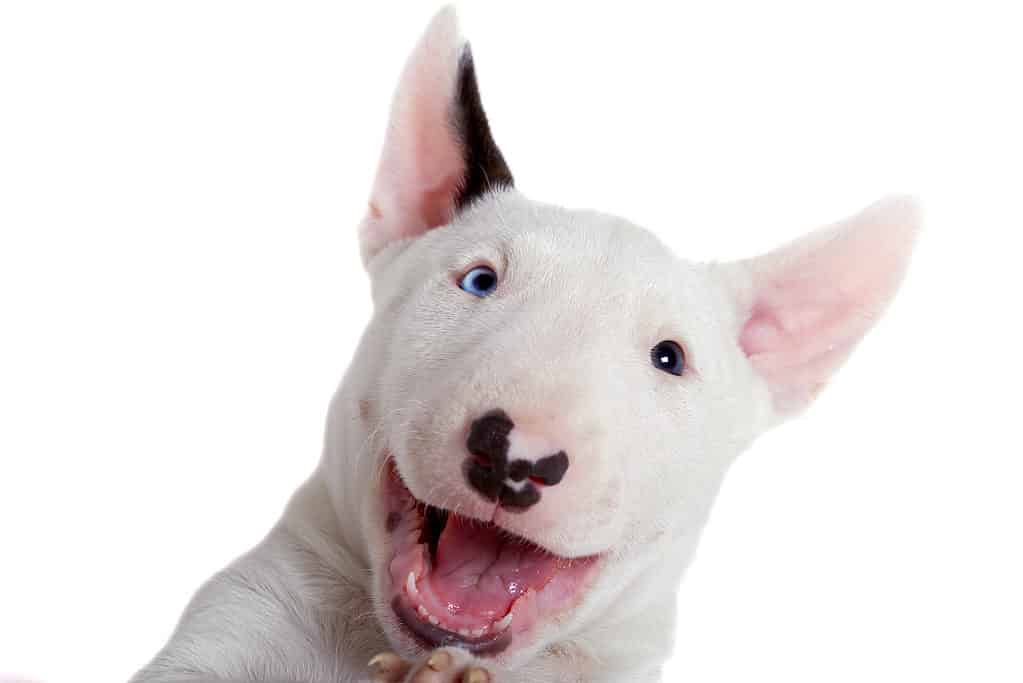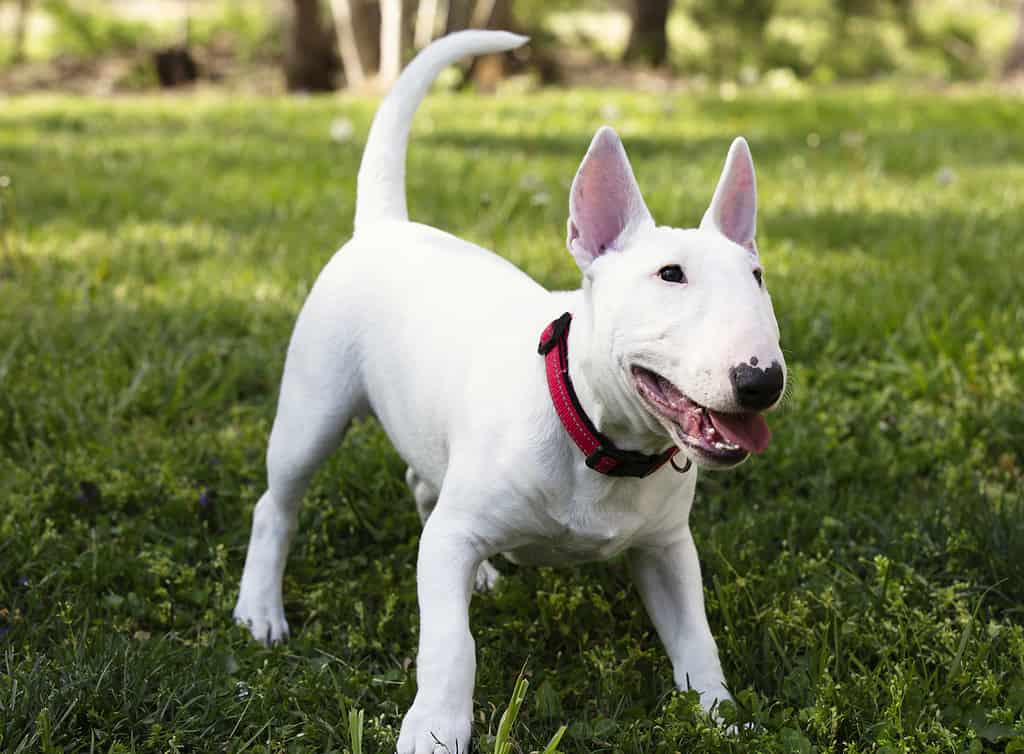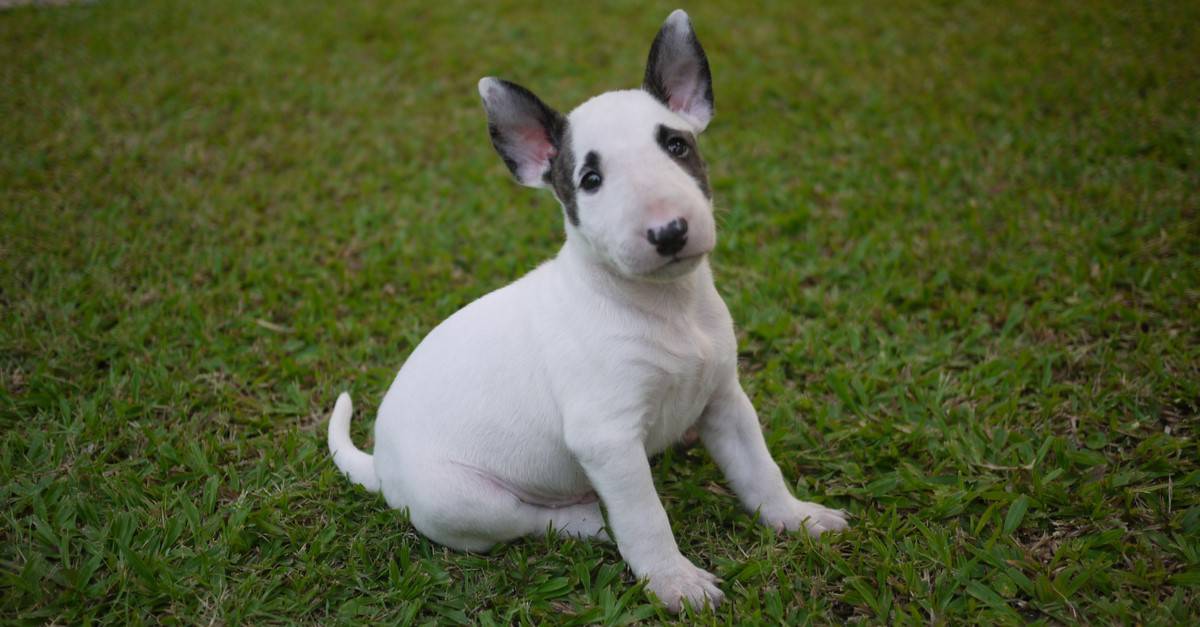If you’re a fan of ’80s advertising and pop culture, you’ve likely heard of Spuds Mackenzie. This adorable canine became an instant icon in the world of beer commercials, but have you ever wondered what kind of dog he was? In this article, we’ll dive into the breed information, pictures, and facts surrounding Spuds Mackenzie to uncover the mystery behind his lovable appearance. Whether you’re a curious pet enthusiast or simply looking for a nostalgic trip down memory lane, join us as we explore everything there is to know about this beloved pup.
What Kind Of Dog Is Spuds Mackenzie?

A female bull terrier played Spuds MacKenzie.
©Patryk Kosmider/Shutterstock.com
Spuds Mackenzie, famously known as the party animal of the 1980s Bud Light commercials, was a bull terrier. This breed is known for its distinctive egg-shaped head and muscular build. Originally bred in England for blood sports such as bull-baiting, the bull terrier has evolved into a beloved family pet with a friendly and affectionate personality. They are highly energetic dogs that require regular exercise and mental stimulation to keep them happy and healthy. The white coat of Spuds Mackenzie was one of his most recognizable features, as this breed is typically found in shades of brindle or fawn. Despite being an iconic figure in advertising history, owning any dog requires responsible ownership and proper training to ensure they live long, happy lives with their human families.
About Bull Terriers
Bull terriers are a breed of dog that is known for their comical and mischievous nature, just like Spuds Mackenzie. They have a playful and endearing personality but can sometimes be stubborn when it comes to training. However, they are always devoted to their owners and thrive on affection and exercise.
These muscular companions have a jaunty stride that suggests both agility and power. Their hallmark feature is their elongated, oval-shaped head with upright and pointed ears, as well as small triangle-shaped eyes that sparkle with good nature. The BT’s coat can come in two types: white or any other color (including an adorable brindle pattern), either solid or marked with white. A well-made bull terrier is the picture of muscular determination and balance.
Bull terriers are a unique breed of dog that requires special care and attention to ensure their happiness. Early socialization with other dogs and people is crucial for this breed. It is important for owners to expose their bull terrier puppies to different environments, people, and animals in order for them to develop into well-adjusted adults.
Firm yet loving training is also essential for the happiness of bull terriers. These intelligent dogs respond well to positive reinforcement techniques such as treats or praise when they exhibit desired behaviors. However, it is equally important for owners to establish themselves as assertive leaders and form a close and trusting bond with their companion animals.
Ample exercise is another key requirement for this breed. Bull terriers have high energy levels and need plenty of physical activity in order to stay healthy and happy. A daily walk or run along with playtime in the backyard can help meet their exercise needs.
Lastly, spending quality time with humans who adore them is crucial for the emotional well-being of bull terriers. They thrive on human companionship and love nothing more than curling up next to their favorite person on the couch after a long day.
Bull Terrier Size

If you’re considering adopting your own personal Spuds MacKenzie, it’s important to know just how big these lovable pups can get. On average, adult bull terriers stand 21-22 inches tall at the shoulder and weigh between 50-70 pounds when fully grown. While this breed is not considered one of the largest breeds out there, their sturdy build and muscular physique make them quite substantial in size.
It’s worth noting that while some individual dogs may fall outside of this size range due to genetic variations or other factors, most healthy adult bull terriers will fall within these general parameters. When selecting a dog for your family or lifestyle, it’s always important to consider both temperament and physical characteristics. So, if you’re looking for a medium-sized pup with plenty of energy and personality to spare, a bull terrier might be just what you need!
Bull Terrier Grooming
If you’re someone who values low-maintenance dog grooming, then the bull terrier might just be the perfect breed for you. Their short, flat coat doesn’t require much upkeep, but it’s still important to give them a little bit of attention each week in order to keep them looking and feeling their best.
One way to care for your bull terrier’s coat is by brushing it once a week with either a soft-bristle brush or a hound glove. This will help remove any dirt or loose hair that may have accumulated on their fur while also distributing natural oils throughout their coat for added shine.
In addition to weekly brushing, it’s crucial to regularly inspect and clean your bull terrier’s ears. Because they have floppy ears that don’t get as much air circulation as other breeds, they can be prone to infections if not properly maintained. Use a gentle ear-cleaning solution and cotton balls to wipe out any excess wax or debris from inside their ears.
Another important aspect of bull terrier grooming is nail trimming. Overgrown nails can cause discomfort when walking or running and even lead to joint issues down the line. Make sure you trim your pup’s nails every few weeks (or whenever you hear them clicking against hard surfaces) using either clippers specifically designed for dogs or an electric grinder.
By following these simple tips, you’ll be able to keep your bull terrier looking sleek and healthy without having to spend too much time on grooming tasks!
Bull Terrier Exercise and Training

Bull terriers have huge personalities and are a ton of fun.
©iStock.com/cindygoff
Bull terriers are a breed that requires regular, moderate exercise on a daily basis in order to maintain their mental and physical health. This is because they were initially bred as both companion and sporting dogs, known for their power and agility. As such, participating in activities like obedience, tracking, agility, and coursing ability tests can be a great way to use the bull terrier’s energy in a positive manner.
Owners of bull terriers should keep in mind that these dogs possess the tenacity and bravery of bulldogs alongside the independent spirit of a typical terrier. However, despite this somewhat stubborn nature, training can still be enjoyable for them as they are more inclined towards having fun than doing work.
To ensure successful training sessions with your bull terrier, it is best practice to reinforce good behavior with treats or toys. Furthermore, owners should take note that bull terriers can excel at dog sports such as bomb detection or search-and-rescue missions due to their innate abilities.
Moreover, these adaptable pooches also make excellent service animals, including assistance dogs for people with disabilities or health-alert dogs who alert their owner about impending seizures, etc. Bull terriers have even been used as therapy animals, which shows how versatile they truly are.
In conclusion, proper training techniques must include patience and humor when working with this breed so as not to discourage them from learning new skills. With consistent effort from owners, there really is no limit to what these amazing creatures can achieve!
History of the Breed

The bull terrier was initially bred to be used in blood sports such as bull-baiting, which were popular in Britain starting in the 13th century. When this activity was outlawed, people turned to dogfighting as a new form of entertainment, and bulldogs were crossed with terriers to create a quicker, more agile fighter. Eventually, pit fighting was also banned, and the breed was transformed into an upper-class companion dog. Breeders worked to refine the looks and temperament of the bull terrier to fulfill this new role.
Ready to discover the top 10 cutest dog breeds in the entire world?
How about the fastest dogs, the largest dogs and those that are -- quite frankly -- just the kindest dogs on the planet? Each day, AZ Animals sends out lists just like this to our thousands of email subscribers. And the best part? It's FREE. Join today by entering your email below.
Thank you for reading! Have some feedback for us? Contact the AZ Animals editorial team.








